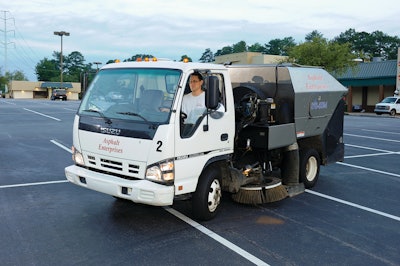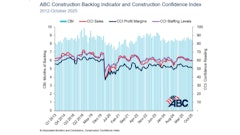
National Service Providers, notorious for undercutting local pricing, holding contractors to nit-picky fine print, delayed payments and more have become for many contractors the scourge of the pavement maintenance industry. But Asphalt Enterprises, entering its 25th year in business, has embraced the work NSPs can provide and works regularly with them -- under a yellow caution flag.
Owned by Scott and Sylvia Richards, the Raleigh, NC, contractor started as a striping company and eventually grew into a one-stop pavement maintenance shop that generates 40% of sales from sweeping and 60% from asphalt maintenance. Sylvia Richards says Asphalt Enterprises has grown every year despite the economic slowdown. “We haven’t grown the 20-30% we had been experiencing years back but we’re still growing,” she says, adding that 2011 was a few percentage points better than 2010, and they expect growth to continue in 2012. “It really helps that we’re in the maintenance end of the business because property managers recognize they have to do proper maintenance.”
And working with national service providers (NSPs) has been a factor in that growth. The contractor has been working with NSPs for eight years and today works with three NSPs which generate an average of 10% of Asphalt Enterprises’ sales each month. “It’s just a fill-in for us but it’s been very successful,” Richards says, adding that NSP-related sales are split 60% sweeping and 40% pavement maintenance.
Richards says that Asphalt Enterprises made a concerted effort to learn how to work with NSPs but initially they did not seek work from NSPs. “They sought us out,” she says. “The first thing we did (for NSPs) was striping or asphalt repairs, one-off jobs. We had stayed away from NSPs because we heard some horror stories and then we looked into it pretty well before getting involved. We wanted to make sure we had a positive experience with them going in and overall we really have – but the key to that is our approach to working with them.”
It All Starts with the Contract
Richards says that whenever any contractor receives a request for a proposal from any national service provider – or any customer – the contractor must understand the terms of that specific project. Richards, who had experience reading contracts at a previous job, takes it upon herself to read all contracts, paying special attention to the fine print in any contract Asphalt Enterprises is considering taking on but especially NSP contracts.
“If they say you need pictures before and after the job then you’ve got to have pictures before and after – and with today’s technology that’s pretty easy,” Richards says. “If you come to them with your invoice and you don’t have the photos, or only have the ‘after’ photos, it’s going to delay your payment. But you should already know that because you should have read the terms of that particular project.
She cites one example where a vendor wanted Asphalt Enterprises to bid on sweeping several locations and the fine print in the contract said that to get paid they were required to obtain a manager’s signature each time they performed the work at each location.
“But most parking lot sweeping is done at night so there is no manager on duty when we’re working,” she says. “That means we would have to go back to that location after each sweep to get the manager to sign off, and that means an extra trip out to that property. And it can mean standing around 30-40 minutes waiting for the manager only to find out the manager whose signature you need isn’t there that day. All that has to be taken into account when you’re considering the contract and pricing your bid because that’s a lot of time wasted and money you aren’t making.”
Asphalt Enterprises decided not to bid that particular job.
Richards says contractors also have to pay close attention to the timing of what the vendor is asking for and how that timing that fits into your business and the other work you do. “If they want 20 ‘big box’ stores striped in the month of July and there’s no leeway in that timetable it’s probably not in your best interest to take on that contract [because it most likely will conflict with your other work, your regular customers],” she says.
Some NSPs pay at 30 days and some pay at 45 days “but that’s right in the contract so we know that up front,” she says. Some NSPs require the contractor to go on the Internet to get a confirmation number for the sweeping they did, then that confirmation number has to be on the invoice you send in. “So put it on your invoice and you won’t have any problems,” she says.
Contracts Can Work Both Ways
“Once an NSP wanted us to help them out because another local contractor wasn’t fulfilling the contract and the property manager wasn’t happy with them. That contractor wasn’t dependable and they didn’t do a good job when they were out there.”
So Asphalt Enterprises reviewed and agreed to a 60-day contract and stepped in and did the work.
“Once the 60 days were done they came back to us and said that because the client wasn’t initially happy they wanted us to take less money. But we pointed out that we had agreed to a contract and that the client was happy with us but not happy with the initial contractor,” Richards says. “They tried to get us to renegotiate the price for those 60 days of work and we wouldn’t do it. We did get paid based on the contract but we are leery of working with that vendor now. We still work with them but we scrutinize their contracts very closely.”
“As long as we fulfill what the contract requires we get our payment right on time, just like they say. But it does require that you follow all their steps and procedures. If they want you to fulfill invoicing in a certain way, and some do, then you have to do it their way. We are very organized and we handle that very easily but I can see if you are lax in your invoicing procedures then there might be a problem.”
Know Your Costs
In addition to knowing the contract specifics, Richards says that contractors need to know their own costs so they can know when the work offered through an NSP – which always wants the lowest-cost contract -- isn’t worthwhile.
“We can tell you per minute what each job costs for sweeping. We can tell per square foot what each striping job costs,” she says. “We really know our costs so when we bid we bid with confidence.”
She says that in most cases NSPs have already bid a job before they seek the contractor to perform the work. “Then they come to us after they’ve been awarded the contract to get our bid. About 30% of the time they will come to us and ask us to bid the work and they incorporate our numbers into their bid.”
But Asphalt Enterprises doesn’t bid on all requests for proposals.
“We bid on about 40% of the opportunities we get and on 60% we say ‘No thank you’ generally because of the terms of the contract.”
Once Sylvia has reviewed the contract she and Scott discuss the fine print and decide whether that business is worth those fine points.
“We make sure we can get the margins we need because you can really get burned. If we can’t make money on a job it’s not worth doing,” Richards says. “If the profit margin isn’t there I don’t do it. Why should I waste my valuable resources and equipment on something I can’t make any money on? I think that’s just bad business practice.”
And one thing Asphalt Enterprises refuses to do is buy additional equipment to take on a job through an NSP.
“Excess capacity is important and it’s something we take into account on every contract with NSPs. But we don’t buy extra equipment to be able to get a job through an NSP,” she says. “With another local large company we are bidding directly we absolutely would buy a piece of equipment to handle a new large job but we wouldn’t do it for a national vendor,” she says. “We aren’t going to contract anything we can’t afford to lose next year.”
But all things considered, work that came through national service providers has helped Asphalt Enterprises continue its growth over the last eight years. “We don’t typically go after business from big box retailers, mainly because they use NSPs and because their decision makers are hard to reach. So in that sense our relationship with NSPs brings additional work and clients to us that we otherwise wouldn’t have,” Richards says.
“We have it figured out for what’s right for us. I’m not sure if it’s right for other contractors but using NSPs this way works for us.”
END
How to Work with NSPs: Communicate
Asphalt Enterprises’ Sylvia Richards says identifying the key contact person at each NSP and establishing good communication with that person can also make working with NSPs easier, though she admits some NSPs are better than others at communicating.
“I like to have contact with the customer. I really enjoying calling and working with the customer and I enjoy the face to face. We have that with some NSPs but not all,” she says.
“I will tell them ‘I can’t do it tomorrow’ but I will also tell them when I can do it,” she says. “I will also tell them ‘I can’t do that but here’s what I can do.’ I will let them know that we can try to help them out even if it’s not what they want, and they seem to appreciate that most of the time. I think they appreciate the fact that we’re honest with them.”
“We’re going to do a high-quality job or we’re not going to do it at all,” Richards says. “That’s our reputation in the area and that’s how we’re going to do it.”
“Establishing good communication is very important, but good communication is common for us. We work with all our customers that way,” Richards says. “We let them know in advance when we expect to be on their job, we let them know if there’s some type of change in the schedule, we let them know when the job is done etc. You can prevent or solve an awful lot of problems with good communication.”
How to Work with NSPs: Use GPS Tracking
Sylvia Richards says that because of some of the reporting and documenting requirements NSPs require, implementing GPS tracking is almost essential, at least for sweeping. “I don’t think we’d ever agree to enter an NSP contract without having GPS installed on our trucks. It provides a level of confidence,” she says.
“If a property manager calls the vendor and says he looked at his security cameras and didn’t see us on the property, then the vendor calls us. We can go right to the GPS and determine when we were there, when we pulled off and basically provide proof that we did what we said we did. Technology doesn’t lie. Using GPS we can prove we did the job and we can get paid. Yes, we were there. It’s rare we have to submit proof like that but on one occasion we did have to prove it and once we sent in the GPS information there were no questions asked.”
How to Work with NSPS: Be Organized
Being well organized is also a key to a successful relationship with NSPs. “We are an organized company and that’s been one of the keys to our successes with NSPs,” says Sylvia Richards, co-owner of Asphalt Enterprises.
“We factor in somewhat our administrative costs but it’s more important to factor in things such as having to obtain a manager’s signature, or if you have to log into their system online and things like that. It’s not just actual labor hours and normal overhead costs we factor in. With the Internet a lot of administrative costs that used to be high are less now and some things are easier to do. It only takes a minute or two on the Internet to get a confirmation number, for example.”



















